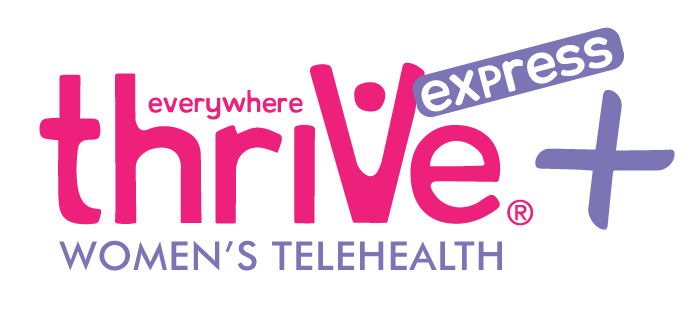Have you heard of ovulation tests? Some women use them when they’re trying to track their cycles or fertility. They might be trying to conceive or just trying to learn more about their bodies. If you’re curious about these little strips and what they do, you’ve come to the right place!
ThriVe+ is a safe place for women to ask questions about pregnancy, STDs, and abortion. Here on our blog, we answer questions about women’s health. That’s because we really care about your health and your future. We’re here to equip you with the info you need to make choices for yourself.
ThriVe+ is your village — we’re real women, here to support you with medically-accurate information.
Today we’re having a chat about ovulation tests. Whatever your reason is for looking into ovulation tests, we’ve got your back. Here are the facts about these tests, so you can take care of your health. You deserve it!

What is an ovulation test and how does it work?
Think of ovulation tests as your personal fertility detectives. They detect the surge in luteinizing hormone (LH) in your urine, which usually happens a day to a day and a half before you ovulate.1 So, when the test shows a positive result, it’s like your body saying, “Hey, we’re gearing up to release an egg soon.”
But what’s ovulation? Excellent question!
It’s super normal to have questions about things like ovulation. Our bodies are all different, so our cycles don’t always happen the same way. But most women ovulate, and most women go through a typical menstrual cycle. Here’s more info about ovulation:
1. What is ovulation?
Ovulation is when one of your ovaries releases an egg. It usually happens once a month, about halfway through your menstrual cycle.
2. Why does it happen?
Well, your body’s gearing up for a potential pregnancy. When that egg gets released, it travels down your fallopian tube, ready to meet up with some sperm. If you have sex, there’s a possibility that the man’s sperm will fertilize the egg. That’s how pregnancy happens.
3. How do I know when I’m ovulating?
Some women can feel it happening — a twinge or some mild cramping (called Mittelschmerz). But signs like these can be easy to miss (ovulation pain may only last a couple of minutes).2 Ovulation tests can be a way to help you understand what’s happening inside your body. They detect a surge in LH, a hormone that spikes just before ovulation. However, ovulation tests aren’t foolproof. It’s possible to get a false positive or false negative.3
4. What happens if the egg isn’t fertilized?
If your egg doesn’t meet up with sperm, it breaks down and gets reabsorbed by your body. Your hormone levels drop, and your uterine lining sheds — that’s your period!
5. What if I don’t ovulate regularly?
Many women’s cycles are a bit wonky now and then. Some women have longer or shorter cycles. But if you’re consistently irregular or not ovulating at all, it’s worth chatting with a healthcare provider.4 They can help figure out what’s up and how to help.
So, that’s ovulation in a nutshell.
Still have ovulation test questions?
1. Can an ovulation test tell me if I’m pregnant?
Nope, even though they may look similar, ovulation tests are all about LH, not hCG (the pregnancy hormone).1 So, if you’re wondering about that missed period, reach for a pregnancy test instead. ThriVe+ offers no-cost pregnancy tests that are lab-quality. That means they’re the most accurate test you can get. Please feel welcome to make an appointment if you need answers.
2. Can I use an ovulation test to know if I have an STD?
Ovulation tests only detect the ovulation hormone. They cannot tell you if you have an STD. However, you can get a no-cost STD screening at ThriVe+ to get the answers you need. Ovulation tests do not prevent STDs either.
3. I’m not trying to get pregnant. Are there other reasons to use an ovulation test?
Totally! Some people use them to get to know their cycles better. Understanding when you ovulate can be super helpful for understanding your body. You shouldn’t rely on ovulation tests to prevent pregnancy. They aren’t made for that purpose.14. How accurate are ovulation tests?
They’re pretty accurate at detecting that LH surge, some claiming upwards of 90% accuracy (when used according to directions).1 But remember, just because LH is surging doesn’t guarantee ovulation will happen.3 Bodies are wonderfully complex!
5. What time of day should I take an ovulation test for the best results?
It’s important to follow the directions of your particular test for best results.

Remember, ThriVe is here for you with medically-accurate info about women’s health. If you think you might be pregnant, we’ve got your back with services like:
- pregnancy tests
- STI tests
- Ultrasounds
- and pre-abortion consultations
All of our services are at no-cost to you. That’s because we believe that you deserve to get great health care without breaking the bank. ThriVe+ is pro-woman, no matter what. Come see us anytime.
Sources:
1https://www.fda.gov/medical-devices/home-use-tests/ovulation-urine-test
2https://www.mayoclinic.org/diseases-conditions/mittelschmerz/symptoms-causes/syc-20375122
4https://www.mayoclinic.org/healthy-lifestyle/womens-health/in-depth/menstrual-cycle/art-20047186




